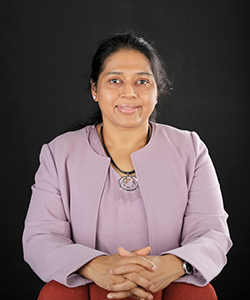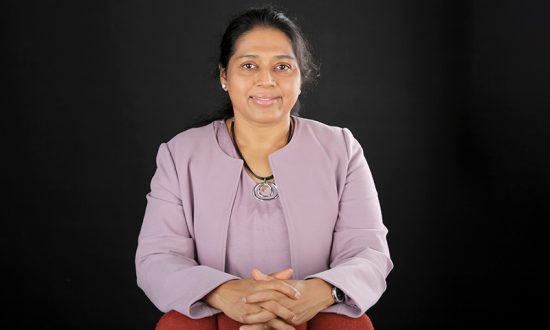Sumana is an experienced IT professional, having spent over 23 years in the industry. This includes global experience across the domain, which includes Delivery management, Risk management, operations management to strategic planning and consulting. She has successfully executed several business plans and has a strong business acumen for handling channel management activities. Before starting Goavega, she worked in several large MNC’s and product companies. Some of her past stints include Symphony Services Corp India Pvt Ltd, where she served as a director for 6 years. Additionally, she was at AIG (American International Assurance), Singapore as Assistant Manager from Jun’01 – Apr’04.
In current challenging times of pandemic, technology has proved to be a vital lifesaver for several industries, including healthcare. With social distancing norms, a series of essential services have moved to the online platform to serve their consumers better, while avoiding physical contact. Healthcare has been one of the most crucial ones among these. While health technology has rapidly evolved over the past decade, it was limited to specific disease/ wellness plans or concentrated around patient treatment. The pandemic has allowed for the role of technology to go beyond the individual patient wellness and moved to the overall ‘digitisation’ of healthcare services – a vital step in the growth of B2B health tech. As per a report titled ‘Digital healthcare market in India 2019’, the sector was valued at INR 116.61 Bn in 2018, and is estimated to reach INR 485.43 Bn by 2024, growing at a CAGR of ~27.41% during the 2019-2024 period. However, areas around the digitisation of data, large scale adoption by hospitals etc., continue to remain slow. In order to ensure a uniform and seamless healthcare technology, that can be a major enabler for the country, is in place, the following areas of technology adoption need to be explored:
1. Clinical Registry: This is one area that needs immediate attention. Supported by positive government policies that work towards digitisation of health data across the country, tech providers can work towards creating customised solutions that can promote seamless exchange of credible healthcare data. The storage of integrated patient record can be useful in case of consultation with a different specialist, irrespective of the geographical boundaries. Further, it can allow data collection from multiple sources, put it in a common format and upload it into the system in an easily accessible manner. Data collection, management, and analytics can go a very long way in not just streamlining treatment but also in preventive healthcare, identifying disease patterns related to deficiencies or external pollutants or even help map and control the spread of an epidemic. On a hospital level, Clinical registry of patients can help easy paperless storage and quick access of data that can help reduce turn-around time for treatments and assist doctors to make quick and effective decisions.
2.Integrated Online Consultation: Online consultation has also proved to be of particular significance during these trying times of a contagious pandemic. However, an increasing number of patient-doctor engagement has been happening on generalised platforms like zoom, skype, google meet or whatsapp video calls, and while it is functional, there is a lot of potential for exploring integrated online consultation technology solutions. According to https://www.itransition.com/, the global market share of tele-health is expected to dramatically increase from $38.3 billion in 2018 to over $130.5 billion by 2025. Hospitals can rely on integrated online consultations for end to end patient engagement, including third party coordination and management. From scheduling appointments, receiving prescriptions, and accessing online history of patients to having access to external investigation reports, scheduling blood tests and having reports directly sent to the doctor, the solution can help hasten the procedure, create transparency and credibility while enhancing patient comfort as they do not need to physically visit the doctor with files of medical data.
3. Mobile Health/ SaaS: Personalised wellness apps on smart phones have been gaining popularity during the lockdown, with people relying on them for daily exercise, yoga, diet and even sleep and water reminders. However, specialised healthcare apps that offer individual consultation and monitoring of patients, can be significant in case of elderly care, and in the wellness of patients with pre-disposed or serious medical conditions. Digital channels of healthcare allow facilities and patients to maintain contact remotely, and encourage daily/ fortnightly monitoring, easy payments, and check-up reminders etc., which can be programmed on a personalised level. Technology of IoMT (Internet of Medical things) can also provide patient care, especially in case of implanted devices like pacemakers etc.
4. Hospital management: Digitisation of hospital management can go a long way in creating cost-effective, seamless, and efficient operations. Automation that can help across segments, from staff schedules and management, OT schedules, specialist visits, third party coordination, including vendors and partners like laboratories, insurance companies etc., to even monitoring and surveillance of hospital premises. Through integrated CCTV cameras, social distancing and mask protocols can be monitored, Critical care rooms and patient movement can be supervised while facial recognition and biometric attendance for staff can be linked with payroll management and account systems.
5. Tech solutions for Pharma: While a lot of innovation in treatment and medical welfare is carried out by pharma companies, adopting technology for operations, data management, and analytics and also for identifying counterfeit batches, has a huge potential. Counterfeit medicines are not only dangerous for patient health but also pose an expensive problem for the pharma sector. Leveraging block-chain, pharma manufacturers can identify and report these fraudulent products and help arrest their spread. Apart from this, recording and storing data around clinical trials, monitoring the progress of new innovations and even collaborating with international scientists, patenting technology and monitoring correct use of drugs, etc., technology adoption can help boost the efficacy and transparency in the pharma sector.
While the above offer a broader perspective to digital adoption, customisation based on socio-economic, demographic and critical care conditions is the way forward for B2B healthcare tech adoption. Further, by collaborating with the numerous Tech and SaaS service providers across the country, hospitals and other medical institutes can easily avail cost-effective, customised, and efficient digital infrastructure to suit their specific requirements. While we continue to march ahead with its ‘Digital India’, ‘Cashless economy’ and centralised registry of citizens, healthcare technology on a national scale will be the determining factor to ensure a healthier and robust population.
More About Sumana Iyengar and Goavega

Sumana is also the Co-founder of Krimzen, which she manages at a part-time basis. Sumana has received the prestigious ‘Women Entrepreneur of the year 2018-19’. Award from WeLeed and Women Empowerment Summit and GIWL Awards 2019 from UBS Forums. At Goavega, she provides leadership to drive growth and customer delight. Sumana has assisted several start-ups in building products from ground zero and launching products to the market.
Established in 2014 “Goavega” is a Bangalore based product engineering services organisation delivering customer needs with high quality and cost-effectiveness. At Goavega, they have straightforward and single-minded focus: to help the customers with innovative and unmatched tools, services, and solutions and make them future-ready / prepare them for the future.


